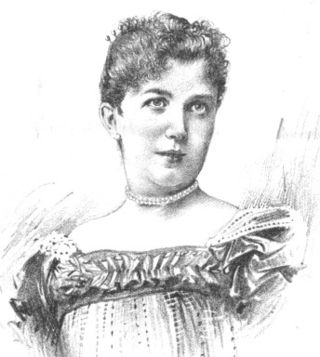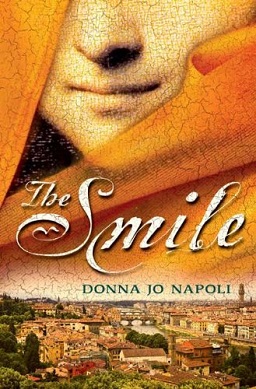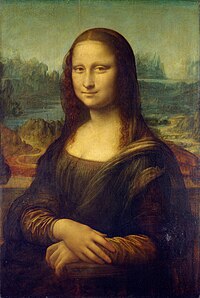
The Mona Lisa is a half-length portrait painting by Italian artist Leonardo da Vinci. Considered an archetypal masterpiece of the Italian Renaissance, it has been described as "the best known, the most visited, the most written about, the most sung about, [and] the most parodied work of art in the world". The painting's novel qualities include the subject's enigmatic expression, monumentality of the composition, the subtle modelling of forms, and the atmospheric illusionism.

The Land of Smiles is a 1929 romantic operetta in three acts by Franz Lehár. The German language libretto was by Ludwig Herzer and Fritz Löhner-Beda. The performance duration is about 100 minutes.

Lisa del Giocondo was an Italian noblewoman and member of the Gherardini family of Florence and Tuscany. Her name was given to the Mona Lisa, her portrait commissioned by her husband and painted by Leonardo da Vinci in the Italian Renaissance.

Max von Schillings was a German conductor, composer and theatre director. He was chief conductor at the Berlin State Opera from 1919 to 1925.
The Mona Lisa is a portrait of a woman by Leonardo da Vinci.

Eine florentinische Tragödie, Op. 16, is an opera in one act by Alexander von Zemlinsky composed in 1915–16 to a libretto adapted by the composer from a German translation by Max Meyerfeld of Oscar Wilde's unfinished play A Florentine Tragedy.

Von heute auf morgen is a one act opera composed by Arnold Schoenberg, to a German libretto by "Max Blonda", the pseudonym of Gertrud Schoenberg, the composer's wife. It is the composer's opus 32.
Jucundus, is a given name or surname of several people and of similar Christian saints. It may refer to:

The 16th-century portrait Mona Lisa, or La Gioconda, painted in oil on a poplar panel by Leonardo da Vinci, has been the subject of a considerable deal of speculation.

Faust is an opera by the German composer Louis Spohr. The libretto, by Joseph Karl Bernard, is based on the legend of Faust; it is not influenced by Goethe's Faust, though Faust, Part One had been published in 1808. Instead, Bernard's libretto draws mainly on Faust plays and poems by Friedrich Maximilian Klinger and Heinrich von Kleist. Spohr's Faust is an important work in the history of German Romantic opera.
Die toten Augen is an opera with a prologue and one act by Eugen d'Albert to a libretto in German by Hanns Heinz Ewers and Marc Henry after Henry's own 1897 play Les yeux morts.

Lisuart und Dariolette, oder Die Frage und die Antwort is a 'romantisch-comische Oper' by the German composer Johann Adam Hiller.

Guido et Ginevra, ou La Peste de Florence is a grand opera in five acts by Fromental Halévy to a libretto by Eugène Scribe. It was premiered on 5 March 1838 by the Paris Opera at the Salle Le Peletier.

Beatrice von Dovsky was an Austrian poet, writer, and actress. She is best known for writing the libretto for Max von Schillings's opera Mona Lisa which she presented to the composer in the spring of 1913. The subject was very topical at the time, because the painting by Leonardo da Vinci had been stolen from the Louvre in 1911, and rediscovered in Florence in 1913. The opera premiered successfully at the Staatsoper Stuttgart in September 1915, and, while not part of the standard opera repertory, has been commercially recorded three times and revived numerous times by major opera houses throughout the 20th century.

Flammen (Flames) is a one-act opera by Franz Schreker, on a libretto by Dora Leen, pseudonym of Dora Pollak.
Albin Swoboda Jr. was a German operatic bass-baritone. Born in Dresden, he was the son of tenor and actor Albin Swoboda Sr. and soprano Friederike Fischer; both of whom were luminaries of the "Golden Age" of Viennese operetta. His grandfather, Joseph Wilhelm Swoboda, also had an important career as a tenor and opera director in Vienna. In 1910 he became romantically involved with opera singer Anna Sutter. Sutter had broken off a relationship with conductor Aloys Obrist around the same time, and Obrist became highly distraught by the situation. On 29 June 1910, Obrist broke into Sutter's apartment, murdered her, and committed suicide in the presence of Swoboda who was unable to stop him.

Adelaide Malanotte was an Italian operatic contralto who performed in major opera houses in Italy from 1806 to 1821. She is best known for creating the title role in the world premiere of Gioachino Rossini's Tancredi in 1813. After her marriage, she performed under the name Adelaide Montresor. Her son, Giovanni Battista Montresor, had a career as a tenor and impresario in the United States. From 1812 until her death 20 years later she carried on an extra-marital affair with the poet Luigi Lechi.

The Smile (2008) is a Young Adult novel by Donna Jo Napoli that details a slice of the life of Monna Elisabetta, better known as the Mona Lisa. Some historical figures enter the plot, including Leonardo da Vinci and members of the famous Medici family. Set in Renaissance Florence, it follows Elisabetta's life up to the moment she models for da Vinci's painting, and suggests the secret behind her famous smile.
Ilana Davidson is an American operatic soprano who has had an active international singing career in operas and concerts. She has sung on several recordings, including as a soloist on a recording of William Bolcom's Songs of Innocence and of Experience with Leonard Slatkin and the University of Michigan chorus and orchestra which won four Grammy Awards including Best Classical Album in 2006. She is the co-artistic director of the Chamber music series ClassicalCafe.
Oberst Chabert is an opera by Hermann Wolfgang von Waltershausen, loosely adapted by the composer from the novel Colonel Chabert by Honoré de Balzac.













